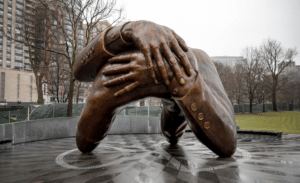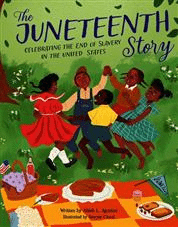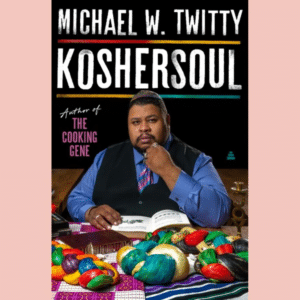Overview
The holiday of Shavuot marks the giving of the Torah to the Israelites at Mount Sinai, seven weeks after the biblical exodus from slavery in Egypt. One week after we observe Shavuot, we celebrate the Federal Holiday Juneteenth which marks the emancipation from slavery in the U.S. We invite you to participate in “Shavuot to Juneteenth: A Journey Toward Liberation” in multiple ways onsite and online.
Our “Journey Toward Liberation” will begin at Temple Israel’s Tikkun Zoom Shavuot on June 11 with several learning sessions offered on the theme of “Shavuot to Juneteenth.”
During the period of time between Shavuot and Juneteenth we recommend that you read, watch, listen, or visit any or all of the following experiences, films, podcasts, playlists, and books.
Below you’ll find a collection of experiences, films, podcasts, playlists, and books
Celebrate
Juneteenth Celebration: June 15
Shattuck Picnic Grove
Boston, MA, 02124
Please email Katie Siegel (ksiegel@tisrael.org) for a meet-up time and location.
Join us for an unforgettable celebration of freedom, unity, and togetherness at the Juneteenth Community Celebration! We invite all community members to volunteer and bring their favorite dishes to share at the cookout. Whether it’s your grandmother’s secret recipe, a family tradition, or a special treat, let’s enjoy it together. This potluck-style gathering will allow us to experience the diversity and tastes that make our community vibrant. We’ll have games and activities for all ages. This event is open to everyone who wishes to support and embrace our shared history. Boston Young Black Professionals encourages attendees to bring their friends, family, and neighbors to celebrate this important occasion. We believe that fostering connections and building bridges can create a stronger, more inclusive community.
Juneteenth Block Party, A Family Reunion at Florida Ruffin Ridley School: June 19
Florida Ruffin Ridley School
Please email Katie Siegel (ksiegel@tisrael.org) for a meet-up time and location.
Brookline For the Culture’s Juneteenth celebration will surely be a hit this year! Join us for a day of family-friendly fun featuring music, food, activities, and more in the form of a block party. This year’s block party will be held on Wednesday, June 19th, from 12:00 to 4 :00 p.m. There will be many fun activities for all to enjoy. For those who prefer a more relaxed approach, there will be various “take a break” areas featuring water and cooling stations and blanketed areas with pillows. Free food will be available, offering tasty treats for everyone, including soul food, Caribbean food, ice cream, and more. There will also be a dance party with a live DJ. The block party is a great way to get together and know your neighbors. It’s a chance to relax, meet new people, and have a good time. There will be something for everyone, from bounce houses and face painting for the kids to live music and dancing for the adults. So come on out and join the party – it will be a great time!
Embrace Ideas Festival Block Party: June 21
Embrace Boston
Roxbury Community College, Parking Lot 1
Please email Katie Siegel (ksiegel@tisrael.org) for a meet-up time and location.
Theroxbury Crossing Orange Line T-stop is two blocks away.
The Juneteenth Block Party at Roxbury Community College (RCC) will close out our week-long celebration of Juneteenth with love and joy. Get ready to dance alongside your friends and family and make new connections with people across the city as we celebrate the spirit of liberation and freedom. The event is free and open to the public, and we strongly encourage you to register. Please note that this event will occur at RCC rather than MassArt.
Reflect
How to Identify Microaggressions & The Importance of Disrupting Them
This tool allows individuals and communities to identify microaggressions within Jewish spaces and how to apologize.
Inclusive Programs Checklist
This checklist serves as a tool that can be used when developing programming to make the space as inclusive as possible.
White-Ashkenazi Awareness Checklist: Examining Privilege
This checklist serves as a tool to create more awareness around privilege within our communities. This checklist allows community members to examine their own privilege in order to develop more inclusive Jewish spaces.
Experience
"Embrace Boston"
 The “Embrace Boston” memorial to Martin Luther King Jr. and Coretta Scott King at 139 Tremont Street on the Boston Common in Boston, aims to connect, educate, and energize communities across traditional borders to cultivate the conditions necessary for racial and economic justice in Boston. If you are not able to see the “Embrace Boston,” you can visit online and enjoy the digital experience.
The “Embrace Boston” memorial to Martin Luther King Jr. and Coretta Scott King at 139 Tremont Street on the Boston Common in Boston, aims to connect, educate, and energize communities across traditional borders to cultivate the conditions necessary for racial and economic justice in Boston. If you are not able to see the “Embrace Boston,” you can visit online and enjoy the digital experience.
The Museum of African American History
The Abiel Smith School (1835) is the oldest public school in the United States that was built for the sole purpose of educating African American children. Its walls tell the story of abolition and equal education. Located steps away from the Massachusetts State House, the Abiel Smith School currently houses first-class exhibit galleries, education programs, and a museum store filled with books and inspired gifts. Learn more about the Museum of African American History.
The Black Heritage Trail of Boston
The Black Heritage Trail is an approximately 1.5-mile-long trail linking sites that explore the trials of the free Black community that inhabited the North Slope of Beacon Hill from the late 18th century through the 19th century.
The Museum of Fine Arts
The Museum of Fine Arts has free admission on Juneteenth. We recommend “Hear Me Now: The Black Potters of Old Edgefield South Carolina.”
Institute of Contemporary Art Boston
Institute of Contemporary Art Boston includes many recommended exhibits, such as:
- Artist Simone Leigh centers the experiences of Black women and Black feminist thought.
- Poss Family Mediatheque features a library of resources on Black feminism, in partnership with Frugal Bookstore — Boston’s only Black-owned bookstore.
- Audio responses to selected works in the exhibitions by students of Spelman College’s AUC Art History + Curatorial Studies Collective will be available in the Mediatheque and on the ICA’s Digital Guide on Bloomberg Connects.
- Boston-based artist Elisa Hamilton’s participatory installation “Can You See Me?” invites visitors to reflect on identity through image and what we choose to share about ourselves.
Watch
What is Juneteenth, and why is it important?
By Karlos K. Hill and Soraya Field Fiorio
At the end of the Civil War, though slavery was technically illegal in all states, it still persisted in the last bastions of the Confederacy. This was the case when Union General Gordon Granger marched his troops into Galveston, Texas on June 19th and announced that all enslaved people there were officially free. Karlos K. Hill and Soraya Field Fiorio dig into the history of Juneteenth. Watch “What is Juneteenth, and why is it important?“
Sesame Street: Let's Celebrate Juneteenth Song | Power of We Club
It’s Juneteenth! Each year on June 19th we gather to reflect on the past and share hope for today. Join Gordon and the Power of We club to celebrate the day when many enslaved African Americans learned of their freedom long ago. Watch here.
What Makes This Jew Different Than All Other Jews? Race, Difference, and Safety in Jewish Spaces, Shais Rishon
We are a people of questions, but perhaps certain types of questions directed at certain kinds of people diminish the safety of all of us. A modern liberal idea? MaNishtana thinks not; he explains that checking people at the door is not something we Jews can or should recognize as traditional.
"Frederick Douglass: In Five Speeches"
While his legacy is undeniable as an author and orator, Frederick Douglass’ provocative speeches were never recorded. Produced by acclaimed historian Henry Louis Gates Jr., and directed by Julia Marchese, “Frederick Douglass: In Five Speeches” aims to bring the legendary abolitionist’s words to life. (58 minutes; HBO / Max.)
"Eyes on the Prize"
Created by Henry Hampton and narrated by political activist Julian Bond, “Eyes on the Prize,” a documentary series about the “glory years” of the civil rights movement from 1955 to 1965, covers everything from the murder of Emmett Till to the Little Rock school riots to the Montgomery, Alabama transit boycott. Perspectives from Coretta Scott King, Kwame Ture, Alabama governor George Wallace, and other figures who have passed since filming make this view of that era all the more valuable. (Each episode is about 55 minutes; PBS.org.)
Listen: Podcasts
Good Trouble!
Sponsored by King Boston and the Massachusetts Budget & Policy Center, “Good Trouble!” (podcast) lifts up the stories of the people fighting the good fight today. Hosted by Gregory Ball, director of content and production at King Boston, and Reginauld Williams, director of communications at MassBudget. You can listen on Apple Music and other platforms, as well as the EmbraceBoston.org site.
Code Switch
NPR (National Public Radio)
“The fearless conversations about race that you’ve been waiting for. Hosted by journalists of color, our podcast tackles the subject of race with empathy and humor. This podcast makes us all part of the conversation—because we’re all part of the story.”
Listen to Code Switch on NPR.
Black American History Crash Course
Over a span of 50 episodes, Clint Smith teaches about the experience of Black people in America, from the arrival of the first enslaved Black people at Jamestown to the Black Lives Matter movement. You can listen to “Black American History Crash Course” on Spotify and other platforms.
Listen: Music
Juneteenth playlists
Various Juneteenth playlists — just type in the word “Juneteenth” on Spotify, Apple Music, or YouTube.
Aretha Franklin – Amazing Grace: The Complete Recordings
Curated by Renee Graham.
Find it on Spotify.
Leontyne Price Sings Spirituals
Leontyne Price, 1997
The Essential Nina Simone
Compilation, 2011 (includes “Mississippi Goddam,” “Strange Fruit,” “I Wish I Knew How it Would Feel to be Free”)
Read
Beyond the Count: Perspectives and Lived Experiences of Jews of Color
Commissioned by the Jews of Color Initiative
Tobin Belzer, PhD1
Tory Brundage, PhC
Vincent Calvetti, MA
Gage Gorsky, PhD
Ari Y. Kelman, PhD
Dalya Perez, PhD
This report uses survey and interview data of a complex fabric of JoC identities, lived experiences, and perspectives. In the context of the national conversation about race in the United States, this study enhances American Jews’ understanding of their own racial and ethnic diversity and provides an opportunity to reflect on how systems of inequality are perpetuated in our own community.
Read “Beyond the Count: Perspectives and Lived Experiences of Color”
Black, White & Jewish: Autobiography of a Shifting Self
A memoir by Rebecca Walker
The Civil Rights movement brought author Alice Walker and lawyer Mel Leventhal together, and in 1969 their daughter, Rebecca, was born. Some saw this unusual copper-colored girl as an outrage or an oddity; others viewed her as a symbol of harmony, a triumph of love over hate. But after her parents divorced, leaving her a lonely only child ferrying between two worlds that only seemed to grow further apart, Rebecca was no longer sure what she represented. In this book, Rebecca Leventhal Walker attempts to define herself as a soul instead of a symbol—and offers a new look at the challenge of personal identity, in a story at once strikingly unique and truly universal. Learn more and purchase the book.
Evolve
Evolve is a website that publishes essays and complies resources from across the diaspora that explore Judaism. These are a collection of essays surrounding race and being what it means to be Jewish.
Jewcy: Jewish Queer Lesbian Feminisms for the Twenty First Century
Edited by Marla Brettschneider
Jewcy is a collection of writings that highlight the intersectionalities of Jewish identity. “Opening timely new dialogues between the various fields of Jewish, feminist, queer, trans, decolonial, and critical race studies, Jewcy encourages readers both inside and outside the academy to rethink narrow conceptions of Jewishness.
The STCC Periodic Table of Banned Books
The Springfield Technical Community College library opened an exhibit that puts a spotlight on book banning, which has been on the rise in recent years.
Visit the website to browse the Periodic Table of Banned Books.
Juneteenth Fact Sheet
This fact sheet is prepared by the Congressional Research Service. It gives a strong overview of the history of the holiday and legislation related to its implementation as a government holiday.
The Juneteenth Story: Celebrating the End of Slavery in the United States
 Becker & Mayer, 2022
Becker & Mayer, 2022
By Alliah L. Agostini
Alliah L. Agostini grew up in Buffalo, NewYork, where her grandfather co-founded the city’s Juneteenth Festival in 1976. In her new picture book, “The Juneteenth Story: Celebrating the End of Slavery in the United States,” the author pays tribute to her grandfather’s legacy (the Buffalo Juneteenth Festival is now one of the largest in the nation) and brings to life the Emancipation story for young readers.
How to Raise an Antiracist
(One World, 2022)
By Ibram X. Kendi
This long-awaited follow-up to “How to Be an Antiracist” by Ibram X. Kendi, founding director of BU’s Center for Antiracist Research and BU’s Andrew W. Mellon Professor in the Humanities, has been released in time for Juneteenth 2022. Kendi’s latest book, “How to Raise an Antiracist,” focuses on how individuals can foster growth and analysis among their own families, drawing on his trademark blend of research and personal experience.
Memphis
(The Dial Press, 2022)
By Tara M. Stringfellow
In her debut novel, “Memphis,” Tara M. Stringfellow weaves the personal and political into a family drama spanning three generations of Black women. Memphis, site of the famous April 3, 1968, “I Have Been to the Mountaintop” speech by Martin Luther King, Jr. (GRS’55, Hon.’59) and his assasination one day later, is also the ancestral home of Stringfellow’s fictional North family and their private triumphs and sorrows.
On Juneteenth
(W.W. Norton, 2021)
By Annette Gordon-Reed
Weaving together American history, dramatic family chronicle, and searing episodes of memoir, Annette Gordon-Reed’s “On Juneteenth” provides a historian’s view of the country’s long road to Juneteenth, recounting both its origins in Texas and the enormous hardships that African-Americans have endured in the century since, from Reconstruction through Jim Crow and beyond.
Koshersoul: The Faith and Food Journey of An African American Jew
 (HarperCollins, 2022)
(HarperCollins, 2022)
By Michael Twitty
In “Koshersoul: The Faith and Food Journey of An African American Jew,” Michael W. Twitty considers the marriage of two of the most distinctive culinary cultures in the world today: the foods and traditions of the African Atlantic and the global Jewish diaspora. To Twitty, the creation of African-Jewish cooking is a conversation of migrations and a dialogue of diasporas offering a rich background for inventive recipes and the people who create them.

